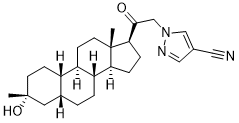Novel MDD Treatment Succeeds in Phase 2 Trial
A novel type of treatment for major depressive disorder (MDD) achieved the main goal of a phase 2 trial, reducing symptoms during a 2-week treatment period. Improvements continued for up to 4 weeks after the medication was stopped.

Drugmaker Sage Therapeutics announced the results of the double-blind, placebo-controlled study of SAGE-217 in a press release.
“If successfully developed, SAGE-217 has the potential to offer the first truly new mechanism of action in the pharmacologic treatment of depression in more than 20 years,” said Steve Kanes, MD, PhD, chief medical officer of Sage Therapeutics, which discovered the compound.
Trivia: How Much Exercise Is Needed to Prevent Depression?
According to the company, SAGE-217 is a “novel, highly potent and selective, next generation GABAA receptor positive allosteric modulator.” The drug was granted Fast Track Designation by the US Food and Drug Administration in May 2017.
The randomized, parallel-group trial involved 89 adults with moderate to severe MDD, represented by a minimum total score of 22 on the 17-item Hamilton Rating Scale for Depression (HAM-D). Participants were stratified based on antidepressant usage and randomized to placebo and treatment groups. The treatment group took 30 mg of SAGE-217 at night with food for 14 days.
At Day 15, those who took SAGE-217 had a mean reduction of 17.6 points on the HAM-D, a statistically significant difference from the 10.7-point mean reduction in the placebo group. Among those taking the drug, 64% had achieved remission (a HAM-D score of 7 or less), compared with 23% of the control group.
Depression as Disconnection: New Lessons From Psychedelic Psychotherapy Studies
The statistically significant improvement in HAM-D score, compared with placebo, was first seen on the morning following the first dose, and was maintained through Week 4 of the study. A difference continued through Week 6, but it was not statistically significant during that time. Remission rates were significantly different at Week 4 (52% vs 28%), but not at Week 6 (45% vs 33%).
Approximately 90% of patients in each group completed the study. Two patients taking SAGE-217 discontinued the trial due to the adverse events.
Of the patients taking SAGE-217, 53% experienced adverse events during the trial, compared with 46% of the placebo group. The most common adverse events in the treatment group were headache, dizziness, nausea, and drowsiness.
December 11, 2017
https://www.psychcongress.com/


